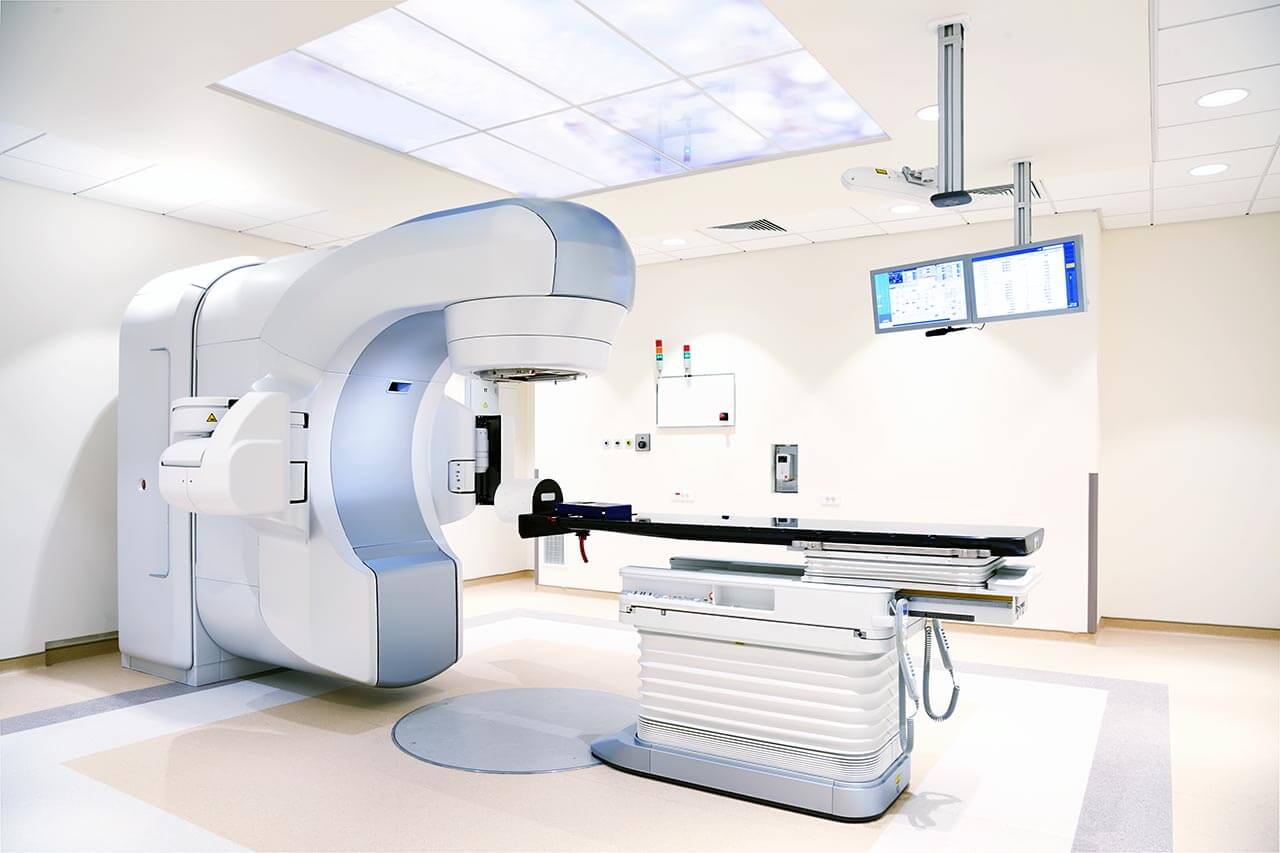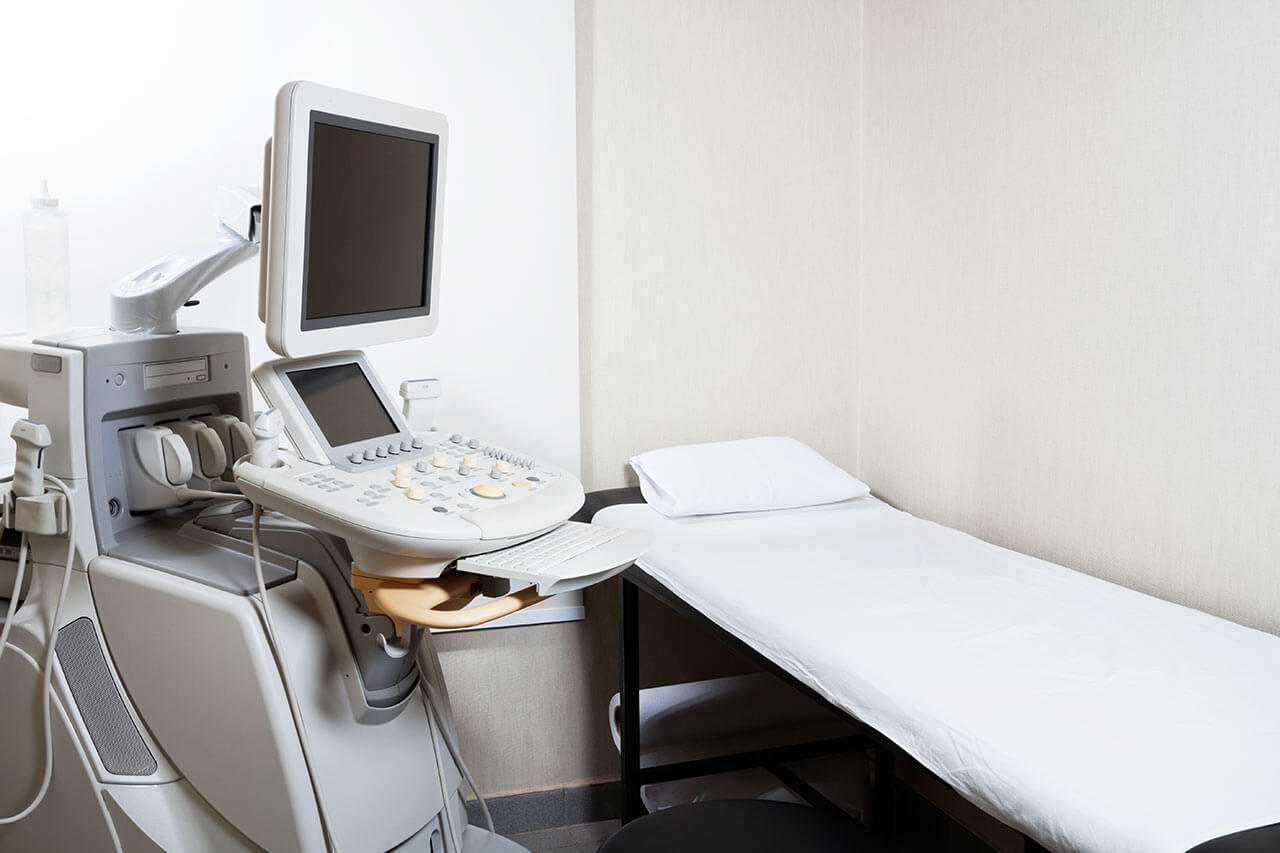
The program includes:
- Initial presentation in the clinic
- clinical history taking
- general clinical examination
- laboratory tests:
- complete blood count
- general urine analysis
- biochemical analysis of blood
- TSH-basal, fT3, fT4
- tumor markers
- inflammation indicators
- indicators of blood coagulation
- hormone blood tests
- abdominal CT/ MRI scan
- ultrasound scan
- 1 course of chemotherapy
- nursing staff services
- elaboration of individual treatment plan
How program is carried out
During the first visit, the doctor will conduct a clinical examination and go through the results of previous laboratory tests and instrumental examinations. After that, you will undergo an additional examination, including laboratory assessment of liver and kidney function, ultrasound scan. Based on the received results, the doctor will elaborate the chemotherapy regimen. If necessary, related medical specialists will be involved in the elaboration of a treatment regimen (tumor board).
Chemotherapy is carried out as the day hospital procedure, without mandatory admission to the hospital. After the placement of a venous catheter, you will stay in a comfortable ward. An infusion system will be connected to the catheter, through which the required drug or a drug combination will be administered. All drugs are administered by intravenous drip, slowly, so the total duration of the infusion can be up to several hours. All this time, doctors and nurses will monitor your health condition closely.
After the course of chemotherapy, you will stay under medical supervision in the ward for a few more hours. If your general condition is good, your doctor will allow you to leave the hospital. You will receive the medical report with detailed recommendations regarding further treatment. In the future, you will be able to have a distant consultation with your attending physician and schedule the next course of chemotherapy, if necessary.
Required documents
- Medical records
- MRI/CT scan (not older than 3 months)
- Biopsy results (if available)
Service
You may also book:
 BookingHealth Price from:
BookingHealth Price from:
About the department
The Department of Pediatric Hematology and Oncology at the Pediatric Diagnostic Hospital M1 Munich offers the full range of medical services to young patients with benign and malignant diseases of the hematopoietic system. The department's doctors focus on children suffering from anemia, blood clotting disorders, leukopenia, leukocytosis, lymphopenia, and hemophilia, as well as malignant blood diseases, including leukemias, hematosarcomas, lymphomas, and myelomas. The department has excellent diagnostic facilities for examining children, including laboratory tests, bone marrow aspiration and biopsy, digital ultrasound scans, magnetic resonance imaging, and other procedures. After making an accurate diagnosis, the department's specialists prescribe an individually tailored treatment regimen for each child, which is aimed at eliminating the causes that provoked the disease and restoring the functioning of the hematopoietic system. The children's health is in the safe hands of highly professional doctors who successfully cope with clinical cases of any complexity. The department is headed by Prof. Dr. med. Stefan Eber.
Doctors at the medical facility regularly treat children with various types of anemia: iron deficiency, vitamin deficiency, folate deficiency, protein deficiency, hereditary, posthemorrhagic, hemolytic, and others. Anemia is a severe pathology in which hemoglobin levels in a child decrease and the structure of red blood cells changes. Symptoms of anemia include pallor and peeling skin, loss of appetite, developmental delay, emotional instability, lethargy, fatigue, weakened immunity, and other complaints. It is enough to perform a set of laboratory tests to detect anemia. In certain cases, a bone marrow biopsy may be required. In many cases, anemia is not an independent disease but develops due to another pathology. In such clinical cases, therapeutic measures are aimed at eliminating the primary disease. In many cases, dietary adjustments are sufficient to treat anemia. The department's doctors recommend normalization of sleep patterns, walks in the fresh air, therapeutic exercises, and massage for young patients with anemia. An integral part of the therapeutic process is drug therapy with iron preparations and vitamin complexes. In severe cases, the child may need a transfusion of red cell concentrates.
In their clinical practice, the department's specialists often deal with such blood clotting disorders as hemophilia and thrombophilia. Hemophilia is an inherited disease in which a child develops a deficiency in blood clotting factor VIII (hemophilia A) or blood clotting factor IX (hemophilia B). The more severe the blood clotting factor deficiency, the more severe the disease. The department carries out blood tests and an assessment of the level of activity of blood coagulation factors to confirm the diagnosis. Special genetic tests can also detect hemophilia during the intrauterine development stage. Hemophilia is an incurable disease, but the specialists at the medical facility successfully use replacement therapy with clotting factor concentrates to control the pathology and ensure a high quality of life. Thrombophilia is characterized by a predisposition to the formation of blood clots. Thrombophilia is one of the main causes of life-threatening conditions such as deep vein thrombosis, myocardial infarction, and stroke. During the diagnostics, the attending physician examines and palpates the child, collects the patient's medical history, and finds out if the patient has a genetic predisposition to thrombophilia. The patient is then prescribed a series of laboratory and hardware examinations, including Doppler ultrasonography, angiography, phlebography, and CT or MRI scans. The essence of thrombophilia therapy is to take anticoagulants to prevent the formation of blood clots.
A special place in the department's work is occupied by the treatment of blood cancer in children. The specialists most often diagnose leukemias, hematosarcomas, lymphomas, and myelomas. At the diagnostic stage, the child undergoes a clinical examination, a complete blood count, a biopsy, a lumbar puncture, and X-ray scans. The treatment tactics are determined depending on the type of blood cancer and the general health condition of the patient. A treatment regimen is usually based on chemotherapy, which may be supplemented by immunotherapy, targeted therapy, and radiation therapy. In complex cases, the department's doctors, in cooperation with partner medical facilities, perform a bone marrow transplant.
The department specializes in the diagnostics and treatment of the following diseases:
- Anemia
- Iron deficiency anemia
- Vitamin deficiency anemia
- Folate deficiency anemia
- Protein deficiency anemia
- Hereditary anemia
- Posthemorrhagic anemia
- Hemolytic anemia
- Blood clotting disorders
- Hemophilia
- Thrombophilia
- Hereditary coagulopathies
- Hematopoietic system disorders
- Leukopenia
- Leukocytosis
- Lymphopenia
- Systemic diseases
- Bleeding diathesis
- Hemorrhagic vasculitis
- Malignant blood diseases
- Hematosarcoma
- Leukemia
- Lymphoma
- Myeloma
- Other diseases of the hematopoietic system
The department's diagnostic and therapeutic options include:
- Diagnostics
- Laboratory tests
- Bone marrow biopsy and aspiration
- Digital ultrasound scans
- Magnetic resonance imaging
- Treatment
- Treatment with iron and folic acid preparations, as well as vitamin complexes
- Blood transfusions
- Treatment with anticoagulants
- Replacement therapy with clotting factor concentrates
- Chemotherapy
- Targeted therapy
- Immunotherapy
- Radiation therapy
- Other medical services
Curriculum vitae
Higher Education
- 1994 - 1980 Medical studies at the Ludwig Maximilian University of Munich.
- 1980 Admission to medical practice.
- 1982 Thesis defense.
Board Certification and Specialization
- 1988 Board certification in Pediatric and Adolescent Medicine
- 1996 Specialization in Neonatology.
Additional Training
- 2001 Stem Cell Therapy Diploma, University of Upper Alsace.
- 2003 Specialization in Pediatric Hematology and Oncology, Diploma by the Swiss Medical Association.
- 2003 Specialist in Hematological Analytics (FAMH), Diploma by the Swiss Society of Medical Genetics.
- 2004 Specialization in Pediatric Hematology and Oncology, Bavarian State Medical Association.
- 2007 Medical License for Basic Psychosomatic Care (KVB).
- 2007 Medical License for Hemostaseology, Bavarian State Medical Association.
Professional Career
- 1981 - 1982 Military Physician in Guenzburg, Danube.
- 1982 - 1989 Fellow in the Department of Pediatrics, University Hospital Goettingen.
- 1989 - 1999 Senior Physician, and since 1994 – Managing Senior Physician, General Department, Department of Infectology, Department for Infants, Hematology and Hemostaseology Outpatient Clinic, and HIV Outpatient Clinic, University Hospital Goettingen.
- 1994 - 1999 Board Member of the Center for Pediatrics at the University Hospital Goettingen.
- 1996 Head of the Working Group of the German Society for Pediatric Oncology and Hematology: guidelines for spherocytosis, thalassemia, and sickle cell disease.
- Since 1999 Head of the Department of Hematology and Oncology at the University Hospital Zurich.
- Since 1999 Board Member of the "Foundation for the promotion of bone marrow transplantation", Ebmatingen, Switzerland.
- Since 2007 Work at the Private Practice for Pediatric Hematology, Oncology, Hemostaseology, and Neonatology.
Awards and Prizes
- 1998 Adalbert Czerny Award from the German Society of Pediatrics and Adolescent Medicine.
- 2017 Günter Landbeck Excellence Award for the Best Clinical Activity with Prof. Harald Schulze at the Hemophilia Conference.
Photo of the doctor: (c) M1 Privatklinik AG
About hospital
The Pediatric Diagnostic Hospital M1 Munich is a top-class medical facility specializing in pediatric and adolescent medicine. The hospital is located in the very heart of Munich. All areas of pediatric and adolescent medicine are represented here, and only high-quality medical services are provided, taking into account a child's diagnosis, his age, general health condition, and other important factors. The young patients are in the safe hands of excellent professionals who have unique clinical experience in treating pathologies in children and get along well with them.
The hospital is proud of its state-of-the-art diagnostic equipment, including devices for ultrasound scanning, comprehensive diagnostics of the cardiovascular system, and the innovative 4D MOTION LAB system, with which doctors can assess the condition of the spine and other anatomical structures of the musculoskeletal system without the use of X-rays.
The hospital has eight departments, and each of them is represented by a highly qualified team of specialists. Medical services are available here in the fields of pediatric pulmonology, endocrinology, hematology, oncology, cardiology, neurology, gastroenterology, nephrology, allergology, and orthopedics. Depending on the complexity of the clinical case, both conservative and surgical treatments can be provided. In the course of surgical interventions, low-traumatic techniques are almost always used, which contribute to the rapid recovery of children.
The hospital's doctors provide patients with highly qualified medical care in accordance with high international standards. In addition, the medical team makes every effort to make a child feel good. An atmosphere of calm and safety reigns here. The Pediatric Diagnostic Hospital M1 Munich enjoys an excellent reputation not only in Germany but also in many other European countries, so parents confidently trust the health of their children to the doctors at this healthcare facility.
Photo: (с) depositphotos
Accommodation in hospital
Patients rooms
The patients of the Pediatric Diagnostic Hospital M1 Munich live in cozy and comfortable rooms. The patient rooms have a modern design and light colors. Each patient room has an ensuite bathroom with a shower and a toilet. The patient room furnishings include an automatically adjustable bed, a bedside table, a table and chairs, a telephone, and a flat-screen TV. Wi-Fi access is also available. There are boxes with toys and children's books in the patient rooms so that children can have a good time. Walking along the corridors of the hospital, young patients will also see soft toys, toy cars, and other interesting things to play with. The hospital offers accommodation for the child in the patient room with one of their parents.
Meals and Menus
The hospital offers three delicious meals a day: breakfast, lunch, and dinner. If a child is on a diet or certain foods need to be excluded from the diet, an individual menu will be offered.
Further details
Standard rooms include:
Accompanying person
Your accompanying person may stay with you in your patient room or at the hotel of your choice during the inpatient program.
Hotel
You may stay at the hotel of your choice during the outpatient program. Our managers will support you for selecting the best option.




